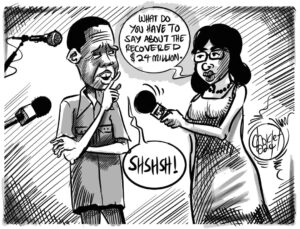Law Association of Zambia president Eddie Mwitwa says even though judges may be satisfied with their working conditions, it remains a fact that they are extremely overwhelmed by the number of cases which are cumulatively assigned to them.
In an interview, Mwitwa observed that judges handle upto about 400 cases at a given time, adding that this was the reason why certain cases seemed to drag for a long time.
“The only thing that I have seen is that I haven’t seen any judge resigning on account of lack of motivation. So with that, one would say they are pretty much satisfied. The only thing obviously is that the workload is just overwhelming from my interaction with most of them. You find that one judge is doing 400 cases at a time, and there is probably one or more new cases added every day,” he said.
“So the environment, yes, we do agree that it [is] probably not as it should be. There must be infrastructural development because most judges until recently did not have chambers of their own, especially in Lusaka. And then there is a new position that is being created for research advocates. I am not so sure whether every judge has got a research advocate. So, things can always be done better.
Mwitwa explained that there was a perception that political cases were given more priority simply because some of them, like the presidential petition, had a time frame specified in the Constitution in which they needed to be cleared.
“The perception obviously is that the political cases tend to be given a bit more priority than ordinary cases. Again, it depends with what type of case it is. I will give you an example of election petition, which has a specific time frame allocated to it within which they must start and must be concluded. Sipilisiwe’s employment case may not necessarily have a time frame as prescribed by the law. So, political cases might be something more pressing on account of statutory demand. So, [political] cases do actually affect the ordinary cases and the more election petitions you have, the more ordinary cases will be delayed.” he explained.
Mwitwa said one of the ways in which delivery of justice could be sped up was to operationalise the division of courts at High Court level.
“For us, obviously as an association, we want to see the divisions that the Constitution has created; for instance, the High Court being operationalised. We now have the Family Court that is created in the Constitution; we have an Industrial Labour Division; we have the Commercial Division. So us as an association, we want to see the divisions that the court has created, especially at the High Court, be operationalised. If those divisions are operationalised, the ordinary cases, election petitions and anything that attaches to politics will be dealt by other divisions. That would really help. But all that depends on funding, if the Judiciary is adequately funded, it is not only constitutionally guaranteed but fact is made a reality, and I think a lot of things would move in the right direction,” said Mwitwa.
“I can tell you the things that we have seen as lawyers and one of them in the recent past is how the Constitution provides that the Judiciary is autonomous both in terms of operations and funding. And it has to get its money allocated to it in the national budget through Ministry of Finance. But at the moment that does not appear to be happening. So, obviously I think that could have an adverse effect on the way the institution operates.”












